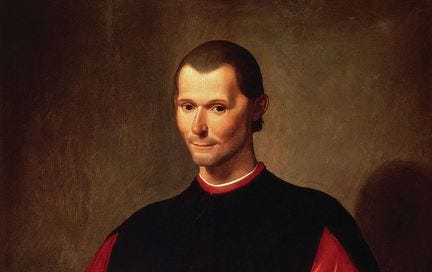I was recently rereading The Discourses (as I periodically enjoy doing) and on Sunday I read a review of an interesting new book on Machiavelli—an inexhaustible topic indeed. So I thought of writing down why I, and I would presume many economists, admire Machiavelli (and thus adding to this inexhaustible topic yet another piece).
There is a clear affinity between economists and political scientists in the Machiavelli tradition. For Machiavelli, the objective of a ruler or a politician is maximization of power in two dimensions, at any point in time and over time. This is exactly the same as maximization of income or utility over time. The ruler is a rational homo politicus in the same way that people, according to economists, are rational homo economicuses.
Moreover, the ruler is a political entrepreneur: his job is no different from a job of a tailor, carpenter, teacher. He is after selfish objectives which are attained under constraints. The constraints for the ruler are of two kinds: he must somehow acquire the power and he must be able to keep it despite attempts of many people to prevent him from coming to power or trying to overthrow him.
The ruler therefore must have the famous virtù which is indeed one of the rarest combination of talents. He must fight off domestic foes, foreign enemies or adversaries, and must combine the use of deception, violence and genuine concern for his subjects in the right proportions to be able to stay in power. Machiavelli’s politician is like a businessman. There are cases when the businessman will gain more by lying and others when he would gain more by telling the truth. Similarly, the ruler would sometimes gain more through violence, guile and ruse, and at other times through honesty and improvements of his subjects’ welfare. The attractiveness of Machiavelli to economists comes also from the fact his ruler always remains a self-interested individual who might do well for his subjects not because he cares about them but because he believes that doing well for them would be ultimately good for himself. In that he is like Adam Smith’s baker: he is selling us bread not because he is concerned about our hunger but because he is concerned about his self-interest.
Throughout centuries Machiavelli has, of course, been accused of condoning many evils. Yet his type of the politician is much more benign and better for the mankind that the types that have normally ruled us. This is because the rulers who actually come to believe they are trying to accomplish good things are most likely to create endless bloodsheds. Most of the killings in history have been motivated by “goodness” and desire to be virtuous. Surely, all religious wars have been such. In recent past, all communist exactions (most notably, the collectivization in the Soviet Union and the Great Leap Forward in China) were motivated by the desire to lift people from their millennial poverty. George W. Bush’s invasion and occupation of Iraq cannot be explained otherwise since no economic or any other rational objective was ever achieved or was even given serious consideration in the decision to wage the war.
The most potentially destructive forces today are hidden under the banner of “goodness”. Whether this is done hypocritically or because the rulers believe in such professions of “goodness” is immaterial; the latter is even worse. The terms under which such “goodness” is projected to the heathens—“the American exceptionalism,”, “the Third Rome”, “Hindutva”, “the new (old) Caliphate”—are nothing but a self-license to impose own values and beliefs on those who dare disagree with them. Such rulers are the most bloodthirsty because belief in own moral superiority renders them unconcerned with reality.
Machiavelli’s ruler will for sure also engage in deception and cruelty, but his objective will never be to impose one form of government or religion, or more generally a set of beliefs as such, on others. He might decide to impose a new government if he believes that this would increase his dominion. This would be a rational objective, grounded in self-interest. Ideological puritans who want to bring happiness to others would engage in such operations more frequently and fully. Disengaging from them implies for the ideological zealots a destruction of their own intimate world of beliefs; never so with Machiavelli’s ruler who would give up the operation once its costs outweigh the benefits.
The world ruled by politicians who follow own interest like Adam Smith’s baker, and leave the rest of the world in peace, may be the best world we can hope for.



